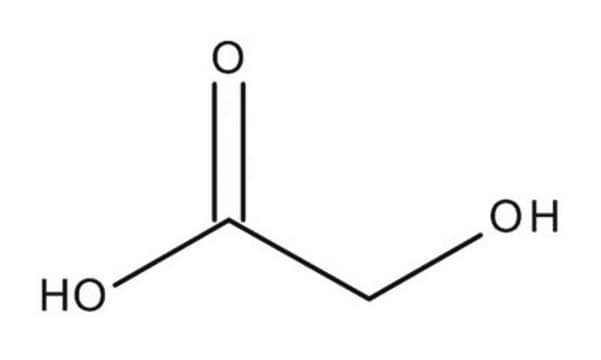8.09691
m-Cresol
for synthesis
Synonym(s):
m-Cresol, 3-Hydroxytoluol, 3-Methylphenol
About This Item
Recommended Products
vapor pressure
0.065 hPa ( 20 °C)
Quality Level
Assay
≥99.0% (GC)
form
liquid
autoignition temp.
626 °C
potency
242 mg/kg LD50, oral (Rat)
expl. lim.
1.06 % (v/v)
pH
5 (20 °C, 20 g/L in H2O)
bp
203 °C/1013 hPa
mp
11.5 °C
transition temp
flash point 86 °C
solubility
23.5 g/L
density
1.03 g/cm3 at 20 °C
storage temp.
2-30°C
InChI
1S/C7H8O/c1-6-3-2-4-7(8)5-6/h2-5,8H,1H3
InChI key
RLSSMJSEOOYNOY-UHFFFAOYSA-N
Looking for similar products? Visit Product Comparison Guide
Application
- Thymol via isopropylation reaction with 2-propanol in the presence of an acid catalyst.
- Terpolymeric resin by an acid-catalyzed polycondensation reaction with hexamine and formaldehyde.
- 4,7-Dimethylcoumarin via modified Pechmann condensation reaction with ethyl acetoacetate.
Analysis Note
Density (d 20 °C/ 4 °C): 1.031 - 1.037
Identity (IR): passes test
Due to its specific melting range the product may be solid, liquid, a solidified melt or a supercooled melt.
Appearance: colorless to dark yellow/light brown. Material may darken with time.
Signal Word
Danger
Hazard Statements
Precautionary Statements
Hazard Classifications
Acute Tox. 3 Dermal - Acute Tox. 3 Oral - Aquatic Chronic 3 - Eye Dam. 1 - Skin Corr. 1B
Storage Class Code
6.1A - Combustible acute toxic Cat. 1 and 2 / very toxic hazardous materials
WGK
WGK 2
Flash Point(F)
186.8 °F - closed cup
Flash Point(C)
86 °C - closed cup
Certificates of Analysis (COA)
Search for Certificates of Analysis (COA) by entering the products Lot/Batch Number. Lot and Batch Numbers can be found on a product’s label following the words ‘Lot’ or ‘Batch’.
Already Own This Product?
Find documentation for the products that you have recently purchased in the Document Library.
Customers Also Viewed
Protocols
Fmoc resin cleavage and deprotection are crucial steps for peptide synthesis, yielding the desired peptide after resin detachment.
Fmoc resin cleavage and deprotection are crucial steps for peptide synthesis, yielding the desired peptide after resin detachment.
Fmoc resin cleavage and deprotection are crucial steps for peptide synthesis, yielding the desired peptide after resin detachment.
Fmoc resin cleavage and deprotection are crucial steps for peptide synthesis, yielding the desired peptide after resin detachment.
Our team of scientists has experience in all areas of research including Life Science, Material Science, Chemical Synthesis, Chromatography, Analytical and many others.
Contact Technical Service









